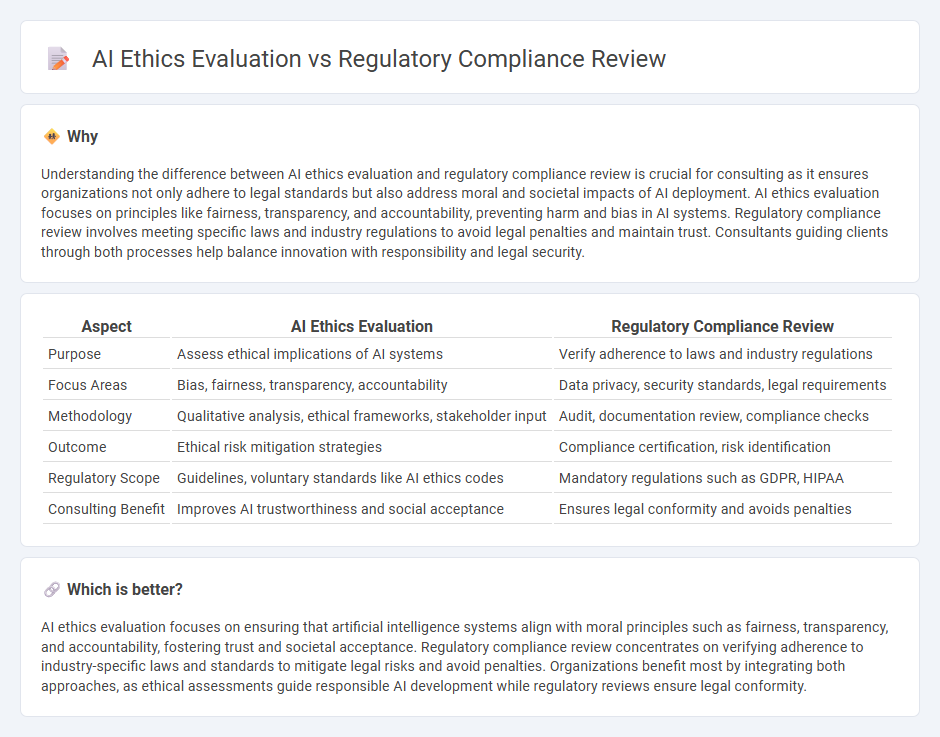
AI ethics evaluation assesses the moral implications and societal impact of artificial intelligence systems, focusing on fairness, transparency, and accountability. Regulatory compliance review ensures that AI technologies meet legal standards and industry-specific regulations to avoid penalties and safeguard data privacy. Explore how integrating both approaches can strengthen your AI strategy and promote responsible innovation.
Why it is important
Understanding the difference between AI ethics evaluation and regulatory compliance review is crucial for consulting as it ensures organizations not only adhere to legal standards but also address moral and societal impacts of AI deployment. AI ethics evaluation focuses on principles like fairness, transparency, and accountability, preventing harm and bias in AI systems. Regulatory compliance review involves meeting specific laws and industry regulations to avoid legal penalties and maintain trust. Consultants guiding clients through both processes help balance innovation with responsibility and legal security.
Comparison Table
| Aspect | AI Ethics Evaluation | Regulatory Compliance Review |
|---|---|---|
| Purpose | Assess ethical implications of AI systems | Verify adherence to laws and industry regulations |
| Focus Areas | Bias, fairness, transparency, accountability | Data privacy, security standards, legal requirements |
| Methodology | Qualitative analysis, ethical frameworks, stakeholder input | Audit, documentation review, compliance checks |
| Outcome | Ethical risk mitigation strategies | Compliance certification, risk identification |
| Regulatory Scope | Guidelines, voluntary standards like AI ethics codes | Mandatory regulations such as GDPR, HIPAA |
| Consulting Benefit | Improves AI trustworthiness and social acceptance | Ensures legal conformity and avoids penalties |
Which is better?
AI ethics evaluation focuses on ensuring that artificial intelligence systems align with moral principles such as fairness, transparency, and accountability, fostering trust and societal acceptance. Regulatory compliance review concentrates on verifying adherence to industry-specific laws and standards to mitigate legal risks and avoid penalties. Organizations benefit most by integrating both approaches, as ethical assessments guide responsible AI development while regulatory reviews ensure legal conformity.
Connection
AI ethics evaluation and regulatory compliance review are intrinsically connected through their shared goal of ensuring responsible AI deployment within legal frameworks. AI ethics evaluation focuses on assessing fairness, transparency, and accountability, which directly supports compliance with regulations such as GDPR and the AI Act. Integrating these processes enables organizations to mitigate legal risks while fostering trust and ethical standards in AI-driven consulting solutions.
Key Terms
Legal Standards
Regulatory compliance review ensures adherence to established legal standards, focusing on laws like GDPR, HIPAA, and industry-specific regulations to mitigate legal risks for organizations. AI ethics evaluation examines the broader implications of AI systems, emphasizing fairness, transparency, accountability, and human rights beyond mere legal mandates. Explore how integrating both approaches strengthens AI governance and ethical innovation.
Bias Assessment
Regulatory compliance reviews ensure adherence to legal standards by systematically identifying and mitigating bias risks in AI models to prevent discrimination and promote fairness. AI ethics evaluations delve deeper into bias assessment by examining the moral implications of algorithmic decisions and their impact on diverse populations, emphasizing transparency and accountability. Explore how bias assessment techniques shape both regulatory and ethical frameworks for trustworthy AI development.
Risk Mitigation
Regulatory compliance review systematically ensures adherence to legal standards, reducing risks of penalties and operational disruptions. AI ethics evaluation addresses potential harms by assessing bias, transparency, and accountability, mitigating reputational and societal risks. Explore how integrating both processes strengthens comprehensive risk mitigation strategies.
Source and External Links
Regulatory Compliance Review - Pharmaceutical Technology - A regulatory compliance review is a program designed to find discrepancies in registered filings, correct them, and identify systemic failures causing noncompliance, differing from a GMP audit by comparing filings with master records rather than actual factory practices.
Compliance Review: What It Is, Why It's Important for Financial ... - A compliance review is an internal, proactive organizational measure that covers all compliance areas, involves key stakeholders, and leverages technology to minimize risk and strengthen compliance frameworks.
Regulatory Compliance: Benefits and Best Practices to Keep Your ... - Best practices for regulatory compliance include identifying applicable regulations and risks, conducting internal audits, and designing a compliance plan involving all stakeholders for effective adherence.
 dowidth.com
dowidth.com